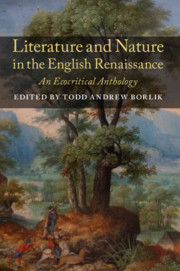Book contents
- Frontmatter
- Contents
- List of Illustrations
- Acknowledgements
- Editorial Principles: Towards the Ecocritical Editing of Renaissance Texts
- Introduction
- PART I Cosmologies
- PART II The Tangled Chain
- PART III Time and Place
- PART IV Interactions
- Animal-Baiting
- Hunting, Hawking
- Fishing
- Pet-Keeping
- Cooking, Feasting, Fasting, Healing
- PART V Environmental Problems in Early Modern England
- PART VI Disaster and Resilience in the Little Ice Age
- Appendix A Industrialization and Environmental Legislation in the Early Anthropocene: A Timeline
- Appendix B Further Reading: A Bibliography of Environmental Scholarship on the English Renaissance
Cooking, Feasting, Fasting, Healing
from PART IV - Interactions
Published online by Cambridge University Press: 05 June 2019
- Frontmatter
- Contents
- List of Illustrations
- Acknowledgements
- Editorial Principles: Towards the Ecocritical Editing of Renaissance Texts
- Introduction
- PART I Cosmologies
- PART II The Tangled Chain
- PART III Time and Place
- PART IV Interactions
- Animal-Baiting
- Hunting, Hawking
- Fishing
- Pet-Keeping
- Cooking, Feasting, Fasting, Healing
- PART V Environmental Problems in Early Modern England
- PART VI Disaster and Resilience in the Little Ice Age
- Appendix A Industrialization and Environmental Legislation in the Early Anthropocene: A Timeline
- Appendix B Further Reading: A Bibliography of Environmental Scholarship on the English Renaissance
Summary
These recipes (or receipts, as they were then called) are taken from a popular Elizabethan cookbook, reprinted over half a dozen times before 1650. The selections have been chosen to showcase the range of foods eaten in early modern England, many of which are not typically found in English markets or butchers today.
Source: The Good Housewife's Jewel (1587), A3v, 4v, 7r-8r, 10v, 14r–v, 16r, 18v, 20v–21r.
To Boil Larks
Take sweetbread ° and strain it into a pipkin; ° and set it on the fire and put in a piece of Butter; and skim it as clean as you can and put in Spinach and Endive; and cut it a little, and so let it boil; and put in Pepper, Cloves, Mace, Cinnamon and Ginger, and a little Verjuice; ° and when you serve them up, lay sops ° in the dish …
[4v] To Boil a Neat's ° Tongue
In primis, [boil] in fair ° Water and salt, then peel it and cut it in the middle; and then boil it in red wine, and fill him full of cloves, and a little sugar; and then wash it with a little sweet broth, to do away the scent of the wine; and you must make a little red Muscadine with red wine and prunes boiled together; then strain it, and strain a little Mustard in a fine cloth together, and so serve it up …
[7r] To Boil a Lamb's Head
Strain your broth into a pipkin and set it on the fire; and put in butter, and skim it as clean as you can; and put in your meat and put in endive, and [7v] cut it a little; and strain a little yeast, and put it into it, and currants and prunes; and put in all manner of spices, and so serve it upon sops …
[8r] To Stew Calf's Feet
Take calf 's feet fair blanched and cut them in the half; and when they be more than half-boiled, put to them great raisins, mutton broth, a little saffron, and sweet butter, pepper, sugar, and some sweet herbs finely minced.
- Type
- Chapter
- Information
- Literature and Nature in the English RenaissanceAn Ecocritical Anthology, pp. 369 - 392Publisher: Cambridge University PressPrint publication year: 2019



